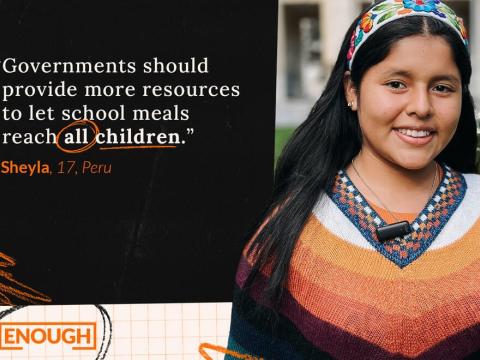
The Power of School Meals for Children, Livelihoods, and Climate Resilience
Andrea Galante considers what the latest global survey of school meal programmes means for ensuring children's present and future nutrition and success.
10 February, 2025
School meal programmes are often perceived as short-term interventions to alleviate hunger and encourage school attendance. However, these programs have far greater potential. They can support livelihoods, promote climate resilience, engage children and communities in creating long-term solutions for food security, and transform entire food systems. Integrating these approaches into school meal policies can combat hunger and build stronger, more sustainable communities.
The 2024 Global Survey of School Meal Programmes, launched last month, is more than just a research effort—it serves as a roadmap for transforming children’s lives, enhancing local economies, and addressing climate challenges. The findings emphasise that investing in school meals yields significant returns: for every $1 invested, up to $9 in economic and social benefits can be generated.
Using Data to Guide School Meal Transformation
Effective school meal programmes depend on data-driven decision-making. Reliable data helps governments and stakeholders assess program coverage, nutritional outcomes, funding needs, and economic impacts. The 2024 Global Survey revealed that:
- Coverage Gaps: Although school meal programmes reached over 407 million children, only 13% of school-age children in low-income countries are covered, compared to 48% in high-income countries.
- Budget Challenges: Low-income countries spend just USD 8 per child per year, far below the USD 611 per child in high-income settings. Accurate budget data helps governments allocate resources more effectively to ensure adequate funding.
Policymakers can make targeted improvements by tracking indicators such as nutritional quality, school attendance, and local food sourcing. For example, data showing low diversity in school meal menus has prompted programmes to include more nutrient-rich, locally available foods.
Programmes can also use data to monitor climate impacts and sustainability measures, such as reductions in food waste, energy efficiency, and the use of climate-friendly crops. Data collection and analysis must become integral to programme management to ensure that school meal programmes are adaptable, effective, and equitable.
Supporting Livelihoods through Local Food Systems
School meal programmes create significant economic opportunities for smallholder farmers and other local food system actors. By sourcing ingredients locally, these programmes provide a stable and reliable market for farmers struggling to sell their produce. 80% of school meal programs in low-income countries aim to provide such market access. This improves farmers' incomes, increases agricultural productivity, and stimulates rural economies.
Beyond farming, school meal programmes create jobs for cooks, food handlers, and other supply chain workers. These jobs, often held by women, promote gender equity and economic empowerment. Additionally, schools use local suppliers and processors to strengthen local business ecosystems and reduce vulnerability to global food market fluctuations.
The ENOUGH Campaign advocates for policies that enhance these local economic linkages, ensuring that school meal programmes drive inclusive development.
Reducing Climate Change Impact with Sustainable Practices
Climate change is a significant threat to food systems, but school meal programmes can be essential in adaptation and mitigation efforts. Programs can reduce their environmental impact by:
- Local Procurement: Sourcing food locally reduces food miles, lowering the carbon footprint of meal delivery. Around 79% of programs globally have adopted strategies to reduce food miles.
- Climate-Friendly Menus: Programmes can introduce drought-resistant and climate-resilient crops such as legumes, cassava, and other nitrogen-fixing plants. These crops require fewer resources to grow, improve soil health, and promote biodiversity.
- Food Waste Reduction: Approximately 81% of school meal programmes have implemented measures to minimise food waste. Initiatives include composting, using sealed storage, and educating students and staff on waste reduction practices.
- Energy Efficiency: Schools are increasingly adopting clean cooking technologies, such as fuel-efficient stoves, to reduce deforestation and air pollution. Some programmes have also experimented with using biogas from composted food waste.
By incorporating these strategies, school meal programmes can contribute to climate resilience while maintaining their core mission of nourishing children.
Empowering Children as Part of the Solution
Children are not just passive beneficiaries of school meal programs—they can be active agents of change. One effective way to engage students is through school community gardens, which serve educational and nutritional purposes. These gardens provide fresh produce for school meals while teaching children about agriculture, nutrition, and sustainability.
Programs like these are particularly impactful in low-income settings, where 84% of school meal programmes include school gardens. These gardens serve as tools to promote food education and provide hands-on learning opportunities in healthy eating habits and environmental stewardship. In 92% of programmes with gardens, the produce is used for student meals, while 44% sell produce to raise revenue. Some programmes also utilise gardens to support students' home consumption, reward teachers, or teach lessons on nutrition and agriculture. Additionally, gardens convert organic waste into fertiliser, fostering environmental sustainability.
Schools foster a sense of responsibility and empowerment by involving children in food production. This helps the next generation understand how they can contribute to solving global challenges like hunger, climate change, and food insecurity.
A Holistic Approach to Sustainable Development
The 2024 Global Survey emphasises that investing in school meal programmes is a strategic investment in the future. These programmes alleviate hunger, strengthen local food systems, create economic opportunities, and promote climate resilience.
By leveraging data to guide continuous improvements, countries can ensure that school meal programmes remain impactful and responsive to changing needs. Accurate data can identify areas for innovation, support targeted funding, and foster collaboration across sectors.
The ENOUGH Campaign advocates for increased investment in school meal programmes, emphasising sustainability and equity. By working together, we can build a future where all children are well-nourished, empowered, and prepared to lead resilient, thriving lives.
To read the Global Child Nutrition Foundation's Global Survey click the link: GCNF-Global-Survey-Report-2024-V1.8.pdf
To learn more about World Vision's ENOUGH campaign calling for all children to have enough healthy food, click this link: ENOUGH | Campaign | World Vision International
Andrea Galante is Senior Policy Advisor for Food Security and Nutrition, Advocacy & External Engagement, World Vision International


